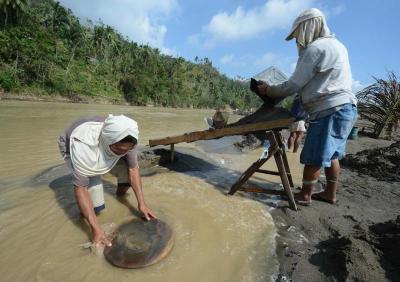 The United Nations Industrial Development Organization (Unido) teamed up with the Philippine government to fight for the elimination of mercury use in artisanal and small-scale mining in the country. The project is entitled “Improve the Health and Environment of Artisanal and Small-scale Gold Mining
The United Nations Industrial Development Organization (Unido) teamed up with the Philippine government to fight for the elimination of mercury use in artisanal and small-scale mining in the country. The project is entitled “Improve the Health and Environment of Artisanal and Small-scale Gold Mining
[ASGM] Communities in the Philippines by Reducing Mercury Emission”.
The main goal is to establish a formal national institution and train key stakeholders – like miners – in orden to strengthen the national capacity to manage mercury. About this, the representative of Unido, Ludovic Bernaudat, said:
We fully support the Philippines’s efforts to address the issue of mercury use in small-scale mining. This project is a testament to the efforts being undertaken by the Philippines in taking a lead in solving this difficult and complex issue.
Representatives from every institution involved in the project participated in the project’s inception workshop, which ended on Thursday (August 29), in Pasig City. This was just the first step to create a national ASGM institution that will work to reduce and maybe eliminate the use of mercury in the small-scale mining sector.
 Besides, the project will develop and deliver health education, techniques and technology-training programs. This includes teaching the communities to early recognize and identify mercury poisoning signs. According to Richard Gutierrez, Ban Toxics executive director:
Besides, the project will develop and deliver health education, techniques and technology-training programs. This includes teaching the communities to early recognize and identify mercury poisoning signs. According to Richard Gutierrez, Ban Toxics executive director:
The beneficiaries of this project are the communities around small-scale mining areas. If we are able to change the mining methods, the approach, and bring a common vision and goal among the miners and the community, Ban Toxics and its partners would have paved the way for a long-term solution to the problem.
The United Nations Environment Program recently revealed that artisanal and small-scale gold mining is the single-largest mercury-emitting sector in the Philippines, responsible for 30 percent of the country’s annual mercury releases. In 2006 the United Nations reported that miners in the Philippines had mercury levels up to 50 times above World Health Organization limits.
As stated by several experts, the indiscriminate use of mercury in the sector contributes to serious long-term environmental and health problems.
Via businessmirror.com.ph
